
- NEWS
- the EDIT
- COMMENTARY
- BUSINESS
- LIFE
- SHOW
- ACTION
- GLOBAL GOALS
- SNAPS
- DYARYO TIRADA
- MORE

The butchers in the bicameral conference committee mangled the 2025 budget to appropriate pork for the 2025 midterm polls and, in the process, violated laws earmarking funds in the yearly allocations for specific purposes.
The items under automatic appropriations and the special accounts in the general fund were painstakingly legislated and fully debated in Congress, Davao City Representative Sid Ungab, former chairperson of the House appropriations panel, lamented.
Ungab exposed the blank items in the bicam report of the 2025 General Appropriations Bill, which were mysteriously filled in the enrolled measure submitted to President Ferdinand Marcos Jr. for signing.
The hunt for the master butchers is now confined to the period between the printing of the bicameral conference committee report, signed by members of the Senate and the House of Representatives, and the submission of the enrolled bill.
The budget manipulation was first revealed when the soft and hard copies of the bicam report were sent to members of the joint Senate and House body, who were given only a few minutes to review the document of more than 200 pages.
Ungab believes the enrolled bill is the “missing link,” and it is now the subject of a complaint with the Supreme Court.
House leaders denied having a hand in the alteration of the budget bill. Strangely, it was Senate President Chiz Escudero and Senate finance panel chief Grace Poe who vigorously defended the amendments contained in the bicam report.
Ungab reported that the bicam altered and superseded several laws earmarking certain funds from sources already specified under the automatic appropriations, particularly special accounts in the general fund.
Among the laws violated were Republic Act (RA) 11239 or the Special Road Fund, which amended RA 8794 or the Motor Vehicle Users’ Charge law.
Laws on the Agricultural Competitiveness Enhancement Fund, the Safeguard Measures Act that seeks to protect local industries from import surges, the Bureau of Fisheries and Aquatic Resources’ Fisheries Management Fund, and the law providing rewards and incentives under the Attrition Act of 2005 were also breached.
Violations were also found in the laws on free internet access in public places, the Bureau of Fire Protection Fire Code income, land registration fees and collections, the Dangerous Drugs Act, the National Endowment Fund for Culture and the Arts, the National Space Agency Act, the Coconut Development Fund and the Coconut Consumer Stabilization Fund, and the use of the Sin Tax of 2012.
Funds for programs under these laws were reallocated through manipulations undertaken in the bicam.
Ungab specifically mentioned the Sin Tax Law, which required 80 percent of the increases in the excise tax on cigarettes and liquors to go to universal healthcare through the Philippine Health Insurance Corp. (PhilHealth).
“Does Congress, acting through the bicameral conference committee, have any legal authority to increase the amounts allocated to the special accounts in the general fund beyond the actual program expenditures backed by their designated revenue sources?” the legislator asked.
In his view, the bicam actions contravened the principle that special accounts in the general fund are intended to be strictly limited to their earmarked revenues and cannot be augmented or transferred arbitrarily.
The outcome is undermining the legitimacy of the entire budget process, “potentially rendering it null and void.”
Ungab underscored that the General Appropriations Act cannot amend or override special laws previously enacted by Congress.
In effect, the bicam disregarded the sanctity of the laws and the institution that created them, to which the scheming legislators belong.
The most corrupt budget ever was the product of the bicam leadership, who don’t give a damn about the sanctity of public funds.
